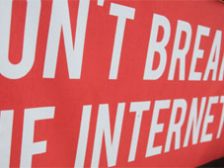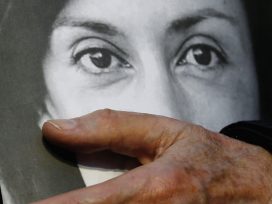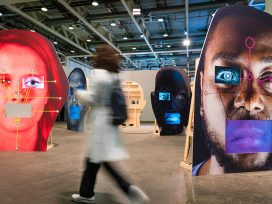1.
Over the past few years a supposedly rational discourse has been cultivated across Europe on the need to balance freedom and security. There is hardly a public discussion, political speech or critical newspaper column, where the apparent truism has not been reiterated that a balance has to be struck between these two noble ideals. While the importance given to freedom or security varies considerably, what seems to be generally accepted is that the current situation is essentially the result of a rational, carefully considered weighing of the needs of both individual citizens as well as of society as a whole. Nothing could be further from the truth. In fact, a completely new logic prevails today. Yet those who participate in the debate, insofar as they say anything of consequence, frame the issue using old, established paradigms.

Server room. Photo: Andrey VP. Source: Shutterstock
2.
When I was a child, our cramped flat in Sofia was bugged as part of a grand technological operation. It was upon the suggestion of the director of the 3rd Subdivision of the 2nd Department of the 6th Directorate of the Bulgarian Committee for State Security (CSS), an officer named Panteleev, that several microphones were installed in our flat in order to gather evidence for the strategic investigation into the object of suspicion, known as G.K.G. (my uncle). The action was carried out one sunny day in spring. To this end all residents were removed for some hours from our building, which housed several families. My uncle’s boss was instructed to send my uncle on a business trip (one agent was to confirm that he boarded the train as planned, another to confirm that he disembarked from the train at the correct destination). The caretaker at the house was informed of the plan and instructed to provide a list of the residents, 17 names in all. My aunt and my grandmother were summoned to the Ministry of Interior, where they were kept waiting for a very long time. Our neighbours on the floor below us, named Tchervenovi (which translates as “the Reds”), were called in for protracted meetings at the local Popular Front office, in recognition of their conformity with the system. A pensioner named Stambolova was invited to a pensioners’ club, where an employee of the secret service was to observe her, just in case she decided to make her way home earlier than expected. Thus each resident was kept away from the building, so that the taskforce of five from the 4th Department, which was responsible for installing the microphones, could force their way into the flat. Meanwhile, two further agents maintained contact with the control room. Positioned before the front door was a protection and surveillance unit of three, who could reach all the units involved in the operation by radio and coordinate any measures to be taken, should unexpected guests be sighted. Simultaneously, the office for state security in the provincial town of Blagoevgrad was instructed to observe my uncle’s parents in case they made a surprise visit to Sofia. Lastly, an order was given for the aptly named “Disturbance Management Unit” to be active until the microphones were successfully installed. In all, a total of 24 employees of the Bulgarian secret service were involved in the operation.
3.
The concepts of “security” and “freedom” are so variable that they cannot be forced into an equation. Security is a project that – and this is the only thing on which everyone agrees – can never reach completion. “There is no such thing as absolute security”: this mantra is repeated ad nauseum, in order to lower citizens’ expectations. Security is all about a real and an insoluble absence: we are never secure enough, there is always more to be done for our security, the only thing that is certain is that nothing is certain, etc.
By contrast, freedom is a fundamental idea and a central tenet of the Enlightenment. We assume that people are born into freedom; political, religious and other constraints limit an absolute right to freedom but at the end of the day “no one can take our freedom away from us, if we do not allow it”, as the truism goes. Complex theories have been developed to explain why, despite their freedom, individuals continuously have to bow to the dictates of the state. In principle at least, freedom for many of us continues to be the essence of the individual, whereas security is a goal of a society, one among its many goals. As such, therefore, freedom and security are not comparable to one another. And the demand for the one to be limited for the other to be attained is conceptual nonsense. But why should philosophy matter when terrorism lurks around the corner? Instead of talking about “freedom” and “security”, it would be more honest to speak of “fear” and “surveillance”. In the wake of the recent attacks in Paris, the headline in the leading Viennese daily newspaper Der Standard read: “Freedom requires security”. The article never spelt out the headline’s perfidious logic:
Freedom requires security
Thus, freedom requires eavesdropping
Thus, freedom requires handcuffs.
In other words:
We don’t need freedom.
A more precise and honest wording would have been:
Fear/insecurity breeds surveillance.
4.
Our apartment in Sofia was bugged at the beginning of the 1970s. It would need ridiculously few resources to accomplish the same today, if those subjected to surveillance were to use mobile phones and computers connected to the Internet. With a few keyboard commands our extended family of six would become digitally transparent. It isn’t even necessary to consider a hypothetical scenario: this is exactly what is happening today, right now, as I speak, in countless apartments around the world. And yet, most of us are probably more shocked by the old-fashioned scenario in Sofia that I have described: the classic mixture of deception, coercion and conspiracy orchestrated by the state, this blatant infringement of our private sphere against which there is little protection. However, surprisingly, today’s more perfidious, invisible intrusions and attacks on our privacy merely leave many of us cold.
There are two stickers on the doors of Vienna’s underground trains. One is green and depicts a security camera, the other is blue and depicts an infant’s pram. The statement is clear and simple: we would like to inform you that you will be under surveillance from the cradle to the grave. This should be clear to anyone who has paid any attention to the media coverage of Edward Snowdon’s revelations over the course of the last two years. Countless articles have highlighted the virtually limitless extent of possible and actually practiced surveillance. Public discourse on the issue has meanwhile shifted dramatically. The existence of mass surveillance is no longer disputed, as it was just a few years ago, when Juli Zeh and I were often accused of exaggeration and hysteria following the publication of our book “Attack on freedom”, which pointed to the illusion of security, the existence of the surveillance state and increasing dismantling of civil rights. We now know that the NSA keeps between three and four billion people under surveillance, that is, every citizen on the planet who is digitally active. We know that it is almost impossible to escape this surveillance, even if we encrypt our communications, since the programmes available on the market all contain a tiny backdoor through which the security services can enter. No one disputes any longer the extent to which data and metadata is gathered. What is debated instead is whether or not such authoritarian control causes any damage to democracy. The debate focuses on individual victims, on innocents, implying both an out-dated understanding of repression and a lack of imagination. The damage to society as a whole is, by contrast, usually disregarded.
5.
In capitalism, no one would dare endanger a successful business model with reasonable or idealistic arguments. According to market research by ASD-Reports in 2013, the annual turnover of the global security-industrial complex totalled 415.53 billion US dollars. And it is expected to continue to rise: a turnover of 544.02 billion dollars is forecast for 2018. At a time when economic growth is slow, such an expansion is breathtaking. Since profit is the oxygen of the system, citizens are required to refrain from polluting the air with too much freedom.
Quality controls otherwise so widespread, therefore, are hardly, if at all, applied to the security sector. And we are yet to see an assessment of whether the recently introduced surveillance mechanisms have brought us any closer to achieving the declared goal of greater and lasting security. While every alimentary product sold in the supermarket must carry a detailed description of its nutritional value, the claim of a “foiled terrorist attack” apparently suffices in the “security” sector. If investigative journalists were to subject such recurring claims to closer scrutiny, it would become apparent that the cases concerned are isolated and few, mostly thwarted by pure chance or by the use of conventional methods of policing, or have involved active and decisive participation of undercover agents, as has been the case on many an occasion. The efficiency of anti-terrorist programmes is never evaluated, even though a number of former employees of the security and secret services (and not least a leading NSA employee, William Binney) have repeatedly questioned whether total surveillance may not in fact be counterproductive.
The principles of the rule of law that are supposed to protect our rights as citizens are overridden by the counter-argument par excellence, namely national security! This in turn frees those who attempt to control everything from any control whatsoever. Transparency is the greatest enemy of those who profess to protect freedom. Complete anonymity where the state is concerned, complete transparency when it comes to citizens: this is the current state of affairs. However, there is a decisive error of thought in this attempt at legitimation. Were those who place such absolute trust in the beneficial effects of total surveillance to take this approach to its logical end, they would have to ensure that those undertaking the surveillance were themselves also subjected to similar surveillance. Selective paranoia is not paranoia at all. It would be advisable to mistrust those who combat subversion on a daily basis, for they are eager to live out their fantasies of omnipotence (inherent to all secret services). It is also advisable to mistrust those who consider paranoia a professional asset. Surely their secretiveness and evasiveness justifiably fuel the suspicion that they themselves have something to hide. This in turn points to their guilt, in accordance with the logic that they themselves postulate. I do not say this in a light vein. To allow the secret services to use all available means to hold society under surveillance without the secret services themselves being subject to any monitoring, implies that you trust the state more than the individual, that you have hibernated during the twentieth century, that you suffer from an epidemic condition called subservience.
6.
The relations between individuals and institutions are currently undergoing fundamental change. Old-fashioned phenomena like “trust” or “reciprocity” are a thing of the past. In times of total surveillance, there are only digital underlings who, in addition to being subject to thorough investigation in real time, may also have their actions anticipated by algorithmic oracles. There is no longer any reason to convince or integrate citizens. Keeping them under surveillance will suffice. Those in power have only to see to it that every person, every object and every machine is part of the same network. In other words: the only relevant freedom is the free flow of information, the complete transparency of data. Fortunately, the leading information companies have already taken care of this. The bottom line is that Facebook and Google are functions of state control. If you refuse to do your digital service, you are guilty by implication; you are liable to be subjected to preventative measures. In The New Digital Age, which he co-authored with Jared Cohen, the former CEO of Google, Eric Schmidt, asserts this new reality in surprisingly blunt terms: “To be sure, there will be people who resist adopting and using technology, people who want nothing to do with virtual profiles, online data systems or smart phones. Yet a government might suspect that people who opt out completely have something to hide and thus are more likely to break laws, and as a counterterrorism measure, that government will build the kind of ‘hidden people’ registry we described earlier. If you don’t have any registered social-networking profiles or mobile subscriptions, and on-line references to you are unusually hard to find, you might be considered a candidate for such a registry. You might also be subjected to a strict set of new regulations that includes rigorous airport screening or travel restrictions.”
Thinking this through just one step further, it becomes evident that someone who refuses to be observed is a terrorist.
“The Internet is the largest experiment involving anarchy in history”, write Schmidt and Cohen at the beginning of their book. In the wake of this technological revolution, it would make sense for the principles of self-organization and collaboration to replace hierarchy and the concentration of power. Can the state authorize such a development if, at the same time, it has the most intrusive technologies of surveillance ever at its disposal?
There can be no individual victims, if we are all victims. This is particularly true in the case of digital technology, which for all its intrusiveness, leaves behind no physical trace. In every film, repression is portrayed in the form of the hero or heroine dragging themselves home with defeat written all over their face. Seldom do we see a user with a traumatized gaze saying: The government stooge read all my Facebook posts. As homo sapiens we still inhabit, with our instincts and our imagination, an overwhelmingly analogue space. Thus, being subjected to complete surveillance strikes us as far less aggressive than the blows of the police officer’s truncheon. The goal of the cybernetic form of government has been formulated time and again: it is not to destroy niches of resistance as used to be the case when this was considered absolutely necessary, but instead to regulate these in a manner that makes the supposedly unforeseeable manageable. The future itself is thus sought to be rendered transparent. Since the beginning of the year, the Bavarian State Police have been testing Precob, a predictive software from the United States. Touchingly, the senior officer responsible Karl Geyer has reassured citizens, saying: “We shall not blindly rely on the system.” An experienced officer will verify every alert. In Los Angeles, the level of automation is already more advanced: the software that calculates probabilities in real time determines the movements of the police patrol cars.
7.
If we wish to grasp the new totalitarian threat, we must understand that it no longer simply concerns the oppression of the individual but the total and absolute control of society through the processing of its data. The individual becomes irrelevant as soon as one can use profiles and patterns to undermine the self-determined future of groups and organizations, neighbourhoods and cities, by regulating the flow of time in the desirable direction. Once this becomes a reality, the individual may even imagine herself to be free.
The question, therefore, is not primarily one of efficiency. Consequently public discourse overlooks a core aspect of the current paradigmatic change: that it is above all about an administocratic and pervasive control of society using new technologies. It remains a moot point as to whether this is linked to a self-fulfilling prophecy by the authorities (a grey man from the catacombs of the security services is on record as saying: “We must be allowed to use all available technologies”), or to the expectation that, as the divide between rich and poor continues to grow, measures necessary to safeguard social peace will have to become more repressive.
It is well known that citizens of the former East Bloc countries continued to whisper critical remarks to one another for years and, in some places, for decades after 1989. How will our behaviour change once we have internalized that even the slightest whisper can be detected and its content disclosed? Will the German saying that “thoughts are free, no one can guess them” hold true in an age in which our Internet browser history, our whereabouts, our reading habits, our library borrowing habits and much more reveal – to say the least – the thematic orientation of (our) thoughts, if not their very character? Will we stop thinking? Surveillance inevitably leads to self-censorship, the most elegant and efficient form of censorship of all: for the individual controls herself and remains, therefore, unsusceptible to alien interference in her thoughts. What is fatal here, however, is that – once self-regulation successfully takes effect – the individual feels free, since there is no one talking her into anything, no one forcing her to do something. But do we really want to live in a world in which all that remains of the private sphere slumbers in a dark corner of our brains, as unheard as it is inaccessible, such that we ourselves cannot be certain whether in fact we are capable of cultivating free thought?








